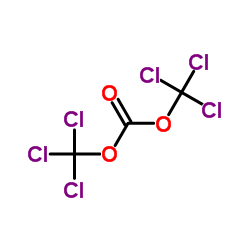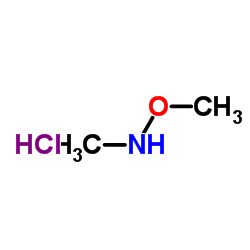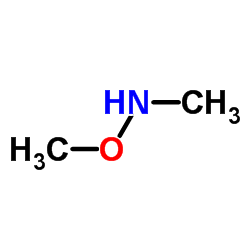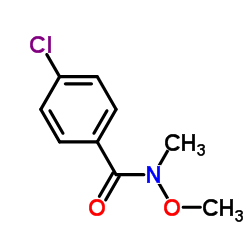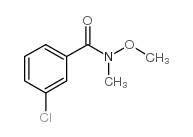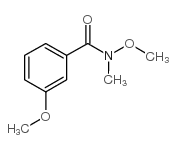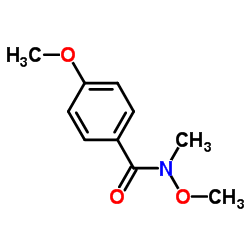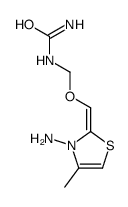30289-28-2
| 中文名 | N-甲氧基-N-甲基氨基甲酰氯 |
|---|---|
| 英文名 | N-methoxy-N-methylcarbamoyl chloride |
| 中文别名 | N-甲氧基-N-甲氨基甲酰氯 |
| 英文别名 |
methoxy(methyl)carbamic chloride
methyl methoxy carbamoyl chloride N-methoxy-N-methylcarbamyl chloride N-Methoxy-N-MethylcarbaMoyl Chloride M2117 methoxymethylcarbamoyl chloride N-methoxy-N-methylcarbamic chloride N-methyl-N-methoxycarbamyl chloride MFCD06658962 |
| 密度 | 1.233g/cm3 |
|---|---|
| 沸点 | 107.9ºC at 760mmHg |
| 分子式 | C3H6ClNO2 |
| 分子量 | 123.53800 |
| 闪点 | 19.1ºC |
| 精确质量 | 123.00900 |
| PSA | 29.54000 |
| LogP | 0.83840 |
| 外观性状 | Liquid | Clear colorless to slightly yellow |
| 折射率 | 1.437 |
| 储存条件 | 密闭于阴凉干燥环境中 |
| 稳定性 | 遵照规定使用和储存则不会分解。 |
| 分子结构 | 1、 摩尔折射率:26.29 2、 摩尔体积(m3/mol):100.1 3、 等张比容(90.2K):240.3 4、 表面张力(dyne/cm):33.1 5、 极化率(10-24cm3):10.42 |
| 计算化学 | 1.疏水参数计算参考值(XlogP):0.8 2.氢键供体数量:0 3.氢键受体数量:2 4.可旋转化学键数量:1 5.互变异构体数量:无 6.拓扑分子极性表面积29.5 7.重原子数量:7 8.表面电荷:0 9.复杂度:75.3 10.同位素原子数量:0 11.确定原子立构中心数量:0 12.不确定原子立构中心数量:0 13.确定化学键立构中心数量:0 14.不确定化学键立构中心数量:0 15.共价键单元数量:1 |
| 更多 | 1. 性状:无可用 2. 密度(g/mL,25/4℃):无可用 3. 相对蒸汽密度(g/mL,空气=1):无可用 4. 熔点(ºC):无可用 5. 沸点(ºC,常压):无可用 6. 沸点(ºC,5.2kPa):无可用 7. 折射率:1.442-1.444 8. 闪点(ºC):无可用 9. 比旋光度(º):无可用 10. 自燃点或引燃温度(ºC):无可用 11. 蒸气压(kPa,25ºC):无可用 12. 饱和蒸气压(kPa,60ºC):无可用 13. 燃烧热(KJ/mol):无可用 14. 临界温度(ºC):无可用 15. 临界压力(KPa):无可用 16. 油水(辛醇/水)分配系数的对数值:无可用 17. 爆炸上限(%,V/V):无可用 18. 爆炸下限(%,V/V):无可用 19. 溶解性:无可用 |
Synonym:None Known Section 2 - COMPOSITION, INFORMATION ON INGREDIENTS
Risk Phrases: 20/22 29 34 40 Section 3 - HAZARDS IDENTIFICATION EMERGENCY OVERVIEW
Harmful by inhalation and if swallowed. Contact with water liberates toxic gas. Causes burns. Limited evidence of a carcinogenic effect.Water-reactive. Potential Health Effects Eye: Causes eye burns. Skin: Causes skin burns. Ingestion: Harmful if swallowed. Causes gastrointestinal tract burns. Inhalation: Harmful if inhaled. Causes chemical burns to the respiratory tract. Chronic: Chronic exposure may cause effects similar to those of acute exposure. Limited evidence of a carcinogenic effect. Section 4 - FIRST AID MEASURES Eyes: Immediately flush eyes with plenty of water for at least 15 minutes, occasionally lifting the upper and lower eyelids. Get medical aid immediately. Skin: If water-reactive products are embedded in the skin, no water should be applied. The embedded products should be covered with a light oil. In case of contact, immediately flush skin with plenty of water for at least 15 minutes while removing contaminated clothing and shoes. Get medical aid immediately. Wash clothing before reuse. Ingestion: If swallowed, do NOT induce vomiting. Get medical aid immediately. If victim is fully conscious, give a cupful of water. Never give anything by mouth to an unconscious person. Inhalation: Get medical aid immediately. Remove from exposure and move to fresh air immediately. If breathing is difficult, give oxygen. Do NOT use mouth-to-mouth resuscitation. If breathing has ceased apply artificial respiration using oxygen and a suitable mechanical device such as a bag and a mask. Notes to Physician: Treat symptomatically and supportively. Section 5 - FIRE FIGHTING MEASURES General Information: As in any fire, wear a self-contained breathing apparatus in pressure-demand, MSHA/NIOSH (approved or equivalent), and full protective gear. During a fire, irritating and highly toxic gases may be generated by thermal decomposition or combustion. Water Reactive. Material will react with water and may release a flammable and/or toxic gas. Extinguishing Media: Use foam, dry chemical, or carbon dioxide. DO NOT USE WATER! Section 6 - ACCIDENTAL RELEASE MEASURES General Information: Use proper personal protective equipment as indicated in Section 8. Spills/Leaks: Absorb spill with inert material (e.g. vermiculite, sand or earth), then place in suitable container. Avoid runoff into storm sewers and ditches which lead to waterways. Clean up spills immediately, observing precautions in the Protective Equipment section. Provide ventilation. Do not expose spill to water. Section 7 - HANDLING and STORAGE Handling: Do not breathe dust, vapor, mist, or gas. Do not get in eyes, on skin, or on clothing. Keep container tightly closed. Do not ingest or inhale. Do not allow contact with water. Use only in a chemical fume hood. Discard contaminated shoes. Keep from contact with moist air and steam. Use only with adequate ventilation. Storage: Store in a cool, dry place. Store in a tightly closed container. Keep away from water. Corrosives area. Section 8 - EXPOSURE CONTROLS, PERSONAL PROTECTION Engineering Controls: Use explosion-proof ventilation equipment. Facilities storing or utilizing this material should be equipped with an eyewash facility and a safety shower. Use adequate ventilation to keep airborne concentrations low. Exposure Limits CAS# 30289-28-2: Personal Protective Equipment Eyes: Wear appropriate protective eyeglasses or chemical safety goggles as described by OSHA's eye and face protection regulations in 29 CFR 1910.133 or European Standard EN166. Skin: Wear appropriate protective gloves to prevent skin exposure. Clothing: Wear appropriate protective clothing to prevent skin exposure. Respirators: Follow the OSHA respirator regulations found in 29 CFR 1910.134 or European Standard EN 149. Use a NIOSH/MSHA or European Standard EN 149 approved respirator if exposure limits are exceeded or if irritation or other symptoms are experienced. Section 9 - PHYSICAL AND CHEMICAL PROPERTIES Physical State: Liquid Color: Not available. Odor: Not available. pH: Not available. Vapor Pressure: Not available. Viscosity: Not available. Boiling Point: Not available. Freezing/Melting Point: Not available. Autoignition Temperature: Not available. Flash Point: Not available. Explosion Limits, lower: Not available. Explosion Limits, upper: Not available. Decomposition Temperature: Solubility in water: Specific Gravity/Density: Molecular Formula: C3H6ClNO2 Molecular Weight: 123.54 Section 10 - STABILITY AND REACTIVITY Chemical Stability: Reacts with water to form toxic fumes. Reacts with water to form hydrogen chloride, a toxic and corrosive gas. Conditions to Avoid: Incompatible materials, exposure to moist air or water. Incompatibilities with Other Materials: Water. Hazardous Decomposition Products: Hydrogen chloride, nitrogen oxides, carbon monoxide, carbon dioxide. Hazardous Polymerization: Has not been reported Section 11 - TOXICOLOGICAL INFORMATION RTECS#: CAS# 30289-28-2 unlisted. LD50/LC50: Not available. Carcinogenicity: N-Methoxy-N-methycarbamoyl chloride - Not listed by ACGIH, IARC, or NTP. Section 12 - ECOLOGICAL INFORMATION Ecotoxicity: Fish: Pseudomonas putida: Section 13 - DISPOSAL CONSIDERATIONS Dispose of in a manner consistent with federal, state, and local regulations. Section 14 - TRANSPORT INFORMATION IATA Shipping Name: CORROSIVE LIQUID, WATER REACTIVE, N.O.S. Hazard Class: 8 UN Number: 3094 Packing Group: II IMO Shipping Name: CORROSIVE LIQUID, WATER REACTIVE, N.O.S. Hazard Class: 8 UN Number: 3094 Packing Group: II RID/ADR Shipping Name: CORROSIVE LIQUID, WATER REACTIVE, N.O.S. Hazard Class: 8 UN Number: 3094 Packing group: II Section 15 - REGULATORY INFORMATION European/International Regulations European Labeling in Accordance with EC Directives Hazard Symbols: C Risk Phrases: R 20/22 Harmful by inhalation and if swallowed. R 29 Contact with water liberates toxic gas. R 34 Causes burns. R 40 Limited evidence of a carcinogenic effect. Safety Phrases: S 26 In case of contact with eyes, rinse immediately with plenty of water and seek medical advice. S 36/37/39 Wear suitable protective clothing, gloves and eye/face protection. S 45 In case of accident or if you feel unwell, seek medical advice immediately (show the label where possible). WGK (Water Danger/Protection) CAS# 30289-28-2: No information available. Canada None of the chemicals in this product are listed on the DSL/NDSL list. CAS# 30289-28-2 is not listed on Canada's Ingredient Disclosure List. US FEDERAL TSCA CAS# 30289-28-2 is not listed on the TSCA inventory. It is for research and development use only. SECTION 16 - ADDITIONAL INFORMATION N/A |
|
生态学数据: 该物质对环境可能有危害,对水体应给予特别注意。
|
| 危害码 (欧洲) | C |
|---|---|
| 风险声明 (欧洲) | R29;R34;R40;R20/22 |
| 安全声明 (欧洲) | S26-S45-S36-S37-S39 |
| 危险品运输编码 | UN 3265 8/PG II |
| 包装等级 | II |
| 海关编码 | 2909199090 |
|
~80% 
30289-28-2 |
| 文献:Murakami, Masahiro; Hoshino, Yujiro; Ito, Hajime; Ito, Yoshihiko Chemistry Letters, 1998 , # 2 p. 163 - 164 |
|
~44% 
30289-28-2 |
| 文献:Chervin, I. I.; Nasibov, Sh. S.; Rudchenko, V. F.; Shtamburg, V. G.; Kostyanovskii, R. G. Bulletin of the Academy of Sciences of the USSR, Division of Chemical Science (English Translation), 1981 , vol. 30, # 3 p. 389 - 396 Izvestiya Akademii Nauk SSSR, Seriya Khimicheskaya, 1981 , # 3 p. 544 - 552 |
| 上游产品 4 | |
|---|---|
| 下游产品 9 | |
| 海关编码 | 2909199090 |
|---|---|
| 中文概述 | 2909199090. 其他无环醚及其卤化衍生物(包括磺化,硝化或亚硝化衍生物). 增值税率:17.0%. 退税率:13.0%. 监管条件:无. 最惠国关税:5.5%. 普通关税:30.0% |
| 申报要素 | 品名, 成分含量, 用途 |
| Summary | 2909199090. other acyclic ethers and their halogenated, sulphonated, nitrated or nitrosated derivatives. VAT:17.0%. Tax rebate rate:13.0%. . MFN tariff:5.5%. General tariff:30.0% |


